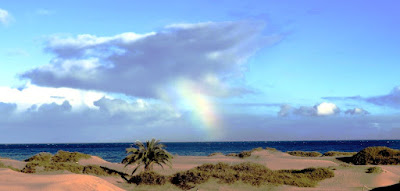Out on the patio on top of a sea cliff, I sit in front my laptop, tapping on the keyboard, trying to introduce a new character to my story while typing the opening scene. The only thing I grapple with is, do I use a real character, or do I need to invent one? I can never decide which.
If the character is real, it will naturally have to be somebody famous, dead or alive. A scientist? Of course. Which one?
There are many that springs to mind. I list the most scientific minds in history – Isaac Newton, Galileo Galilee, Thomas Edison... Thomas Edison! Just the man I need for my story. He is the ideal candidate since I am by the sea. How very illuminating, if you get the joke? Don’t worry if you can’t, because the clue is a rotating beam of light.
While I am on the ‘light’ subject, as I describe it, there is another scientist who imagined travelling through space on a beam of light, and that is Albert Einstein. This is how he came up with “light-speed theory.” And there is Michael Faraday. It is because of this inventor is why I am able to plug in my laptop, turn it on, and start typing my list of these scientific geniuses. Which one should I use in my story? Why not all of them?
All of these share one thing in common. They all experienced that magical moment in their scientific careers. It is thanks to scientists like Thomas Edison that a lighthouse stands on the end of the headland and I watch a cargo ship passing at a safe distance from the shore. There is blue sky above me, stretching half a length of the coastline, punctuated by a heavy cloud casting a dark shadow on the sea. Forked lightning branches out beneath the cloud like roots flickering between the sky and earth. A rumble of thunder drowns out the silence.
‘Just look at
that discharge sparking in the air’, says Michael Faraday.
‘It happens
in a split second. Incredible’, I say.
‘That is a
charge both positive and negative, that is giving off the brilliant flash of
light.’
‘I saw the
lightning first, and then heard the thunder after. Why is that?’
‘The light
from lightning reaches your eye before the sound of thunder enters your ear,’
says Albert Einstein.
‘Why does
that happen?’
‘Light
travels at fantastic speeds, so much so that light is the ultimate threshold in
the universe where nothing exceeds it.’
We are
sitting around the same table, looking out to the Atlantic Ocean while we watch
the lightning spark and glow inside the cloud. I see rain falling faraway,
which looks like long hair touching the ocean.
‘That cloud
has gained so much mass, all the vapour within it has condensed into a mountain
of droplets, which have become so voluminous, they succumb to gravity,’ says Isaac
Newton.
A rainbow
rises from the edge of the cliff, stretches out to sea. We watch the cloud
receding; the thunder growing weaker with the blue filling out in all
directions, as the storm slides along the rugged coastline.
‘To witness
something as awesome and spectacular as this is that magical moment at the
seaside,’ I say.
‘The sunlight
passes through rain droplets, and hence, the droplets split the light into
their constituent colours. Thus, nature creates, as you say, that magical
moment,’ says Isaac Newton.

3 comments:
Love this interpretation of the theme, and the idea of bringing all those great minds together. A nice mix of science and literary endeavour 🙂
An imaginative piece Adam. I like your description of the rain touching the ocean like long hair.
Loved this when you read it, such an interesting take on the theme
Post a Comment